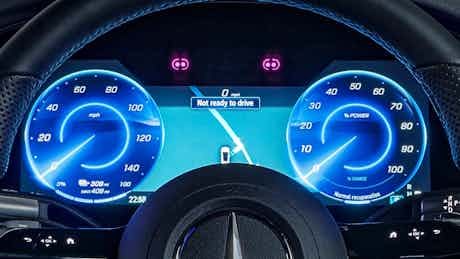How far can an electric car go?
August 06, 2025 by Jamie Edkins

The move to electric cars brings lots of questions – one being how far can an EV go on a single charge. If you’re wondering this, then look no further.
Electric cars represent a big change for motorists, and one of the first questions people ask about EVs is how far can they go on a single charge.
There’s no short answer to this as it depends on a huge variety of factors. The size of the car’s battery has a big impact, as does how effective its power management system is.
Environmental factors also play a big role in how far an EV can go on a single charge: cold weather and hills negatively impact an electric car’s range, and your own driving style has a massive effect, too.
How far can an electric car go on one charge?
EV technology has improved hugely in recent years. The shortest-range EV you can buy from new today is the Smart EQ ForTwo, which has an official range of 68 to 84 miles on a single charge, while the furthest is managed by the Mercedes EQS, which can do up to 481 miles. Moving away from those extreme ends of the scale, a decent range for a family EV is something of the order of 250 miles. In many instances you will need a break to stretch your legs before the car needs recharging.
What affects the range of electric cars?
As set out earlier, EVs, just like petrol and diesel cars, are impacted by a number of factors when it comes to how far they can go before needing to stop and recharge. These include:
1. Ambient temperature
Batteries don’t like extreme temperatures, being particularly unhappy in the cold. While precise figures vary depending on precise temperatures and battery chemistries, EV drivers can expect somewhere around 10 to 30% less range when it’s cold.
2. The type of driving you do
Moving faster requires more energy, while official EV ranges are measured based on using a variety of speeds – some high, some low.
People who do mainly town driving should get much closer to an EV’s official range. If you have a three-hour motorway slog to be doing and stick to 70mph, expect the battery range to be less than the official quoted number.
As with speed, going up gradients requires more energy, meaning a mile travelling uphill will take more from the battery than a mile on the flat.
3. How you drive electric cars
A heavy right foot will make any car’s efficiency worse, and if you frequently use heavy acceleration in an EV, you will use up more battery power than if you are more gentle. It’s also worth noting that increasing your cruising speed even slightly can have a big impact on how much energy is required to move the car: dropping from 70mph to 65mph can have a bigger impact on how far you can go between charges than you might imagine.
4. What systems you have running
Most people know that tumble driers, washing machines and dishwashers draw a lot of energy, partly because they tend to require a heating element to run, and the same is true with electric cars. Crank up the heated seats and have the cabin temperature set high and you’ll notice a big impact on how far an EV can go. Many electric cars have an on-board computer than can tell you how much effect running certain features has on range.
5. The nature of the car and its batteries
Electric car batteries are measured in kiloWatt hours, with a 100kWh battery being large, and a 40kWh battery being pretty small.
Broadly speaking, the bigger the battery, the further the car will go, but a number of other factors come into play here as well, including how heavy the car is (including how many passengers and how much luggage it is carrying), how aerodynamic it is, and how sophisticated the battery chemistry and management system are.
Our guide to how much it costs to charge an EV has more information on this topic.

What’s the difference between claimed and real-world electric range?
Just as with fuel economy figures, official battery ranges for electric cars may not always reflect how far you can travel on a charge in the real world. This is because the standardised testing EVs are put through to calculate how far they can go on one charge are heavily regulated by Worldwide Harmonised Light Vehicle Test Procedure (WLTP) rules.
WLTP tests are hugely complicated and contain countless details, but as one example tests are conducted at 23 degrees celsius without the air-conditioning running, two factors that may not reflect day-to-day driving for many motorists.
As a rule of thumb, real-world ranges can be 10% to 20% short of official ranges, though how you drive could see achieve better or worse numbers than that.
It’s also worth noting that electric cars aren’t designed to be charged to 100% and driven until they reach 0%. To help preserve battery health most EVs recommend charging to 80%, while getting to 0% of charge risks grinding to a halt on the road, and is equivalent to running a petrol or diesel car with the fuel light on for some time.
As such, most owners keep their cars in the 20-80% range, meaning the official range figure has even less relevance for real-world driving. That may sounds like a bit sacrifice, but EVs require a slightly different mindset to conventional cars. After all, if you have a chargepoint at home, this is a little like having your own personal petrol station on your driveway, and with the average driver covering just 20 miles a day, keeping a 250-mile EV within the 20-80% range is pretty workable.
Official WLTP battery range figures are also very useful when comparing different electric cars against each other, just as official mpg economy figures are with petrol and diesel cars.
Which electric cars have the longest range?
Our dedicated guide on the EVs with the longest range should be on your reading list if you’re interested in the cars that can go the furthest, but the top five long-range EVs are:
- Mercedes EQS: up to 481 miles
- Audi A6 Sportback e-tron: up to 461 miles
- Polestar 3: up to 438 miles
- Tesla Model 3: up to 436 miles
- Volkswagen ID.7: up to 436 miles
Car change? Carwow!
Looking for a new set of wheels? With Carwow you can sell your car quickly and for a fair price – as well as find great offers on your next one. Whether you’re looking to buy a car brand new, are after something used or you want to explore car leasing options, Carwow is your one stop shop for new car deals.
Click here to follow us on WhatsApp, where you can keep up-to-date with all the latest news, reviews, advice guides and videos.
















